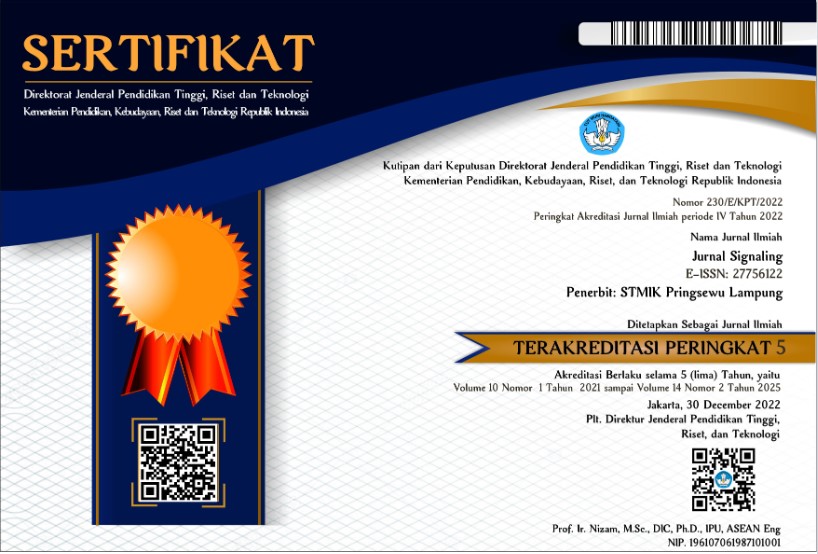BUDAYA ORGANISASI ADAPTIF: STRATEGI MENINGKATKAN KINERJA ORGANISASI DI MASA SULIT
(1) Program Studi Manajemen, Fakultas Ekonomi dan Bisnis, Institut Bakti Nusantara
(2) Program Studi Manajemen, Fakultas Ekonomi dan Bisnis, Institut Bakti Nusantara
 Corresponding Author
Corresponding Author
Abstract
The challenges of an increasingly competitive era make organizations need to look for an approach that is systematic, comprehensive, and adaptive so as to make the organization survive. In addition to the resource factors that support organizational performance, the role of culture as a value and system adopted by all human resources in the organization plays an important role. Organizational culture can be a guide for the organization in carrying out its operations because the truth value also shows the norms adopted in an organization. This study aims to explore the types of culture that are in accordance with the character of increasingly complex challenges for organizations. Qualitative research is used for this research by searching for appropriate literature using an electronic database on organizational culture in the 2018-2022 period which is found in Google Scholar. The results of the study show that implementing an adaptive organizational culture is an effective choice of organizational culture because it allows members to recognize environmental threats and develop solutions to change quickly. In addition, an adaptive organizational culture enables the organization to act in the best interests of the organization by responding appropriately, thereby increasing the organization's chances of survival while enhancing performance.
Keywords
References
Bangun, W. (2008). Budaya Organisasi: Dampaknya pada peningkatan daya saing perusahaan. Jurnal Manajemen Maranatha, 8(1), 38-49.
Bass, B. M., & Avolio, B. J. (1993). Transformational leadership and organizational culture. Public administration quarterly, 112-121.
Cameron, K. S., & Quinn, R. E. (2011). Diagnosing and Changing Organizational Culture: Based on the Competing Values Framework. San Fransisco: Jossey-Bass.
Costanza, D. P., Blacksmith, N., Coats, M. R., Severt, J. B., & DeCostanza, A. H. (2016). The effect of adaptive organizational culture on long-term survival. Journal of Business and Psychology, 31, 361-381.
Daft, R. L. (2007). Management. Ohio: South-Western College Publication.
Denison, D., Lief, C., & Ward, J. L. (2004). Culture in family-owned enterprises: Recognizing and leveraging unique strengths. Family Business Review, 17(1), 61-70.
Detert, J. R., Schroeder, R. G., & Mauriel, J. J. (2000). A framework for linking culture and improvement initiatives in organizations. Academy of management Review, 25(4), 850-863.
Hills, M. D. (2002). Kluckhohn and Strodtbeck's values orientation theory. Online readings in psychology and culture, 4(4).
Hoppe, M. H. (2007). Culture and leader effectiveness: The GLOBE study. Central European Journal of Communication.
Hunt, S. D., Wood, V. R., & Chonko, L. B. (1989). Corporate ethical values and organizational commitment in marketing. Journal of marketing, 53(3), 79-90.
Irfan, S., & Marzuki, N. A. (2018). The moderating effects of organizational culture on the relationship between work motivation and work commitment of university academic staff. International Journal of Learning and Development, 8(1), 137-155.
Jin, K. G., Drozdenko, R., & DeLoughy, S. (2013). The role of corporate value clusters in ethics, social responsibility, and performance: A study of financial professionals and implications for the financial meltdown. Journal of business ethics, 112, 15-24.
Kilmann, R. H. (1985). Five Steps for Closing Culture-gaps. In Gaining Control of The Corporate Culture. San Francisco: Jossey-Bass, 351-369.
Kotter, J. P., & Heskett, J. L. (1992). Corporate Culture and Performance. New York: The Free Press
Lang, D. L. (1992). Organizational culture and commitment. Human Resource Development Quarterly, 3(2), 191-196.
Lapiņa, I., Kairiša, I., & Aramina, D. (2015). Role of organizational culture in the quality management of university. Procedia-Social and Behavioral Sciences, 213, 770-774.
Lejeune, C., & Vas, A. (2009). Organizational culture and effectiveness in business schools: A test of the accreditation impact. Journal of Management Development, 28(8), 728-741.
Lund, D. B. (2003). Organizational culture and job satisfaction. Journal of business & industrial marketing, 18(3), 219-236.
Griffin, R. W. & Moorhead, G. (2013). Organizational Behavior: Managing People and Organizations. Ohio: Cengage Learning.
Nazir, N. A., & Lone, M. A. (2008). Validation of Denison's model of organisational culture and effectiveness in the Indian context. Vision, 12(1), 49-58.
O'Reilly, C. A., & Chatman, J. A. (1996). Culture As Social Control: Corporations, Cults, and Commitment. Research in Organizational Behavior 18:157-200.
Oyemomi, O., Liu, S., Neaga, I., Chen, H., & Nakpodia, F. (2019). How cultural impact on knowledge sharing contributes to organizational performance: Using the fsQCA approach. Journal of Business Research, 94, 313-319.
Pascale, R. T. (1990). Managing on the Edge. New York: Simon and Schuster.
Priyohadi, N. D. (2015). Human Capital Management PT Pelindo III. Yogyakarta: Lintang Rasi Aksara.
Rijal, S. (2010). Leadership style and organizational culture in learning organization: A comparative study. International Journal of Management & Information Systems (IJMIS), 14(5).
Robbins, S. P., & Judge, T. (2013). Organizational Behavior. London: Pearson Education.
Sabri, P. S. U., Ilyas, M., & Amjad, Z. (2011). Organizational culture and its impact on the job satisfaction of the University teachers of Lahore. International Journal of Business and Social Science, 2(24), 121-128.
Schein, E. H. (2010). Organizational Culture and Leadership 4th Edition. San Fransisco: Jossey Bass.
Valle, M. (1999). Crisis, culture and charisma: The new leader's work in public organizations. Public personnel management, 28(2), 245-257.
Vandenberghe, C. (1999). Organizational culture, person–culture fit, and turnover: A replication in the health care industry. Journal of Organizational Behavior: The International Journal of Industrial, Occupational and Organizational Psychology and Behavior, 20(2), 175-184.
Warrick, D. D. (2017). What leaders need to know about organizational culture. Business Horizons, 60(3), 395-404.
Wibowo, W., & Phil, M. (2016). Budaya Organisasi; Sebuah Kebutuhan untuk Meningkatkan Kinerja Jangka Panjang. Jakarta: PT Raja Grafindo Persada.
Article Metrics
Abstract View : 308 times
: 308 times Download : 55 times
Download : 55 times
DOI: 10.56327/signaling.v12i1.1439
Refbacks
- There are currently no refbacks.







